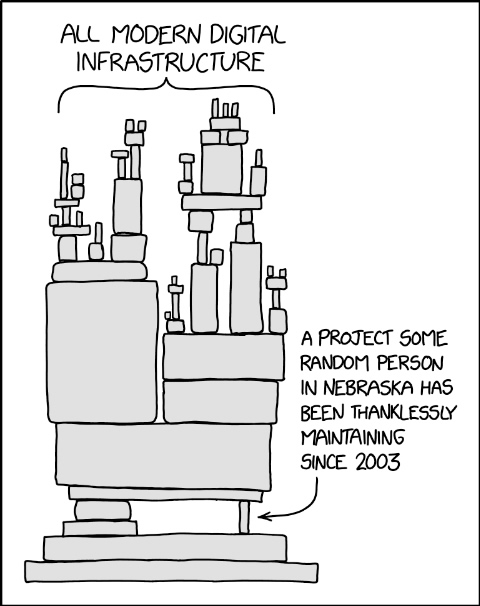Much of the modern world owes its existence to pieces of software that began as passion projects, and whose code is still free for reuse and redistribution by anyone. That is, open source software.
A lot of people don’t realise that open source is pretty much the bedrock of technology and computing as we know it. In fact, free and open source software (FOSS) makes up somewhere between 70-90% of any given modern software solution.
This goes beyond some of the most well-known open source projects, such as Linux, which are well-known for how important they are in keeping the world ticking. Around half of all public web servers use Linux, and it powers nearly three quarters of the world’s mobile devices via Android.
But there is a long list of shamefully unsung open source heroes. Consider PostgreSQL, one of the most important database systems in the world that powers the Met Office, Instagram, Reddit, and even the International Space Station. Or look at Kubernetes, which has come to dominate the IT infrastructure of virtually every enterprise over the past decade.
There are countless thousands of open source projects, ranging from those that are supported by major tech players like Google, Amazon, and Meta, to those maintained by a single volunteer.
At Ballou, we take a lot of pride in working with companies that support and handle the development of open source software. We work with the open source giant Red Hat, ambitious startups like Seldon, and non-profit corporations like Mozilla. These companies work at the very edge of innovation in their practice areas – whether that’s computer science and IT infrastructure, machine learning operations, or responsible standards for web browsing.
The translation challenge
Inevitably, as organisations working in open source software are pushing boundaries, this often means the work involves a lot of complexity. As PR professionals, this poses a couple of significant challenges. Namely:
- Can you understand what your client’s open source projects do, and communicate it in layman’s terms to someone who doesn’t?
- How do you get the media and your client’s desired audiences interested in what your client is doing?
These are difficult challenges. In my view, there’s only really one way to tackle both of them, which is accepting the need to continuously learn. And that learning doesn’t just require making sense of what your client’s open source projects do, but also trying to reckon with the software ecosystem their projects sit in and the use-cases for those projects.
This challenge is one of the things I enjoy most about my job. When working with open source clients, I often see the role of our team as being translators: reckoning with the technical complexity of your client’s work, explaining it in layman’s terms, and then seeking out hooks and opportunities you can attach it to.
But what does this “translation” work entail? What results tend to be most effective for open-source clients? Two big strategies stand out as particularly effective for PR teams:
Case studies
One of the biggest opportunities when working with any client doing complex work, including open source clients, is through case studies and customer success stories. Ultimately, the best advocate for the value of a project or a piece of software is going to be the organisations that use them and can speak to how they’ve seen their lives improve.
Open source case studies can often go hand-in-hand with the trading out of proprietary software and old-fashioned manual workflows, meaning that alongside results there’s also an interesting story of organisational change.
All of this makes case studies a huge boon for dedicated IT and tech press in the UK, including top-tier outlets like ComputerWeekly, which are disproportionately read by the very CTOs, CIOs, and decision-makers that organisations developing open source solutions want to reach.
Thought leadership
The expertise of organisations developing open source projects also opens up thought leadership opportunities. Technical and policy knowledge in an open source organisation is often industry-leading, especially if a team is working on projects at the very cutting-edge of a particular field.
Thought leadership can come in the form of an opinion featured in broader articles exploring news stories or trends, or dedicated ghost-written articles covering a technical or business problem or trend. As well as getting a client’s views out on public record, thought leadership also positions them as an authoritative source in the right industries and sectors.
Wrapping up
Ultimately, when doing PR for teams working on open source projects, you have to accept the need to be continually curious. Along with being able to plug what you’re doing into the agendas of journalists and the public consciousness, a PR also needs to be willing and able to grapple with the inherent complexity of the work and correctly represent it in everyday language. As experts in product and technical communications, the team at Ballou relishes all of this.
